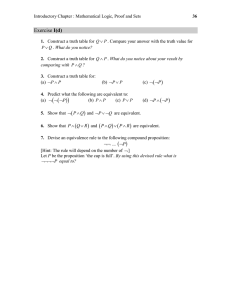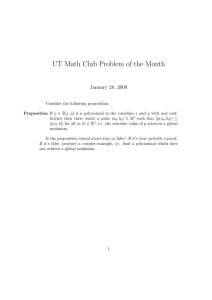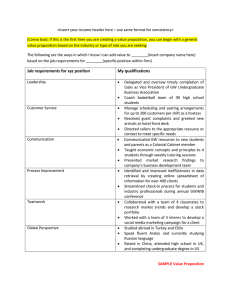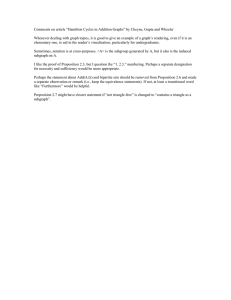Defending The Proposition 65 Bounty Hunter Case
advertisement
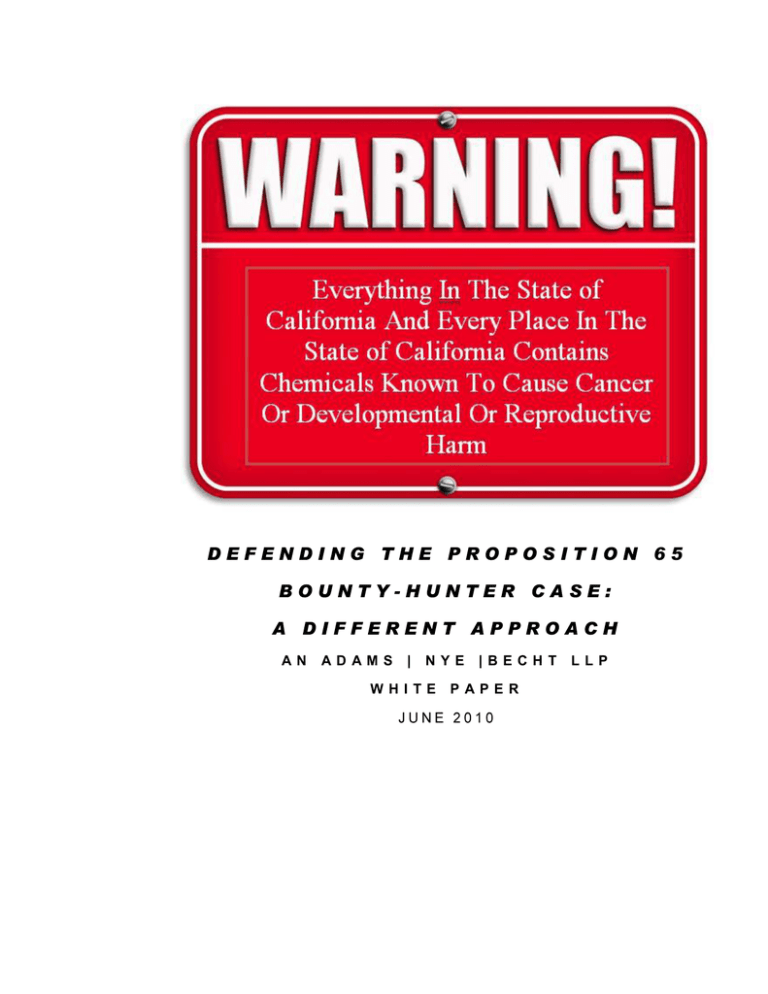
DEFENDING THE PROPOSITION 65
BOUNTY-HUNTER CASE:
A DIFFERENT APPROACH
AN
ADAMS
|
NYE
WHITE
|BECHT
PAPER
LLP
A bounty hunter is an individual who seeks out fugitives ('Hunting') for a
monetary reward ('Bounty') for apprehending by law, if such laws exist.
(In lawless areas, bounty hunters still exist, and are, indeed, even more
common.)
-Definition from Wikipedia, the free online encyclopedia
adams | nye | becht
LLP • ATTORNEYS AT LAW
222 Kearny Street
San Francisco, CA 94108-4521
415.982.8955
www.adamsnye.com
© 2010 adams | nye |becht llp
2
DEFENDING THE PROPOSITION 65
BOUNTY-HUNTER CASE
INTRODUCTION: The Offer You Can't Refuse
California's Proposition 65, and particularly its private party enforcement, or
"bounty hunter" provisions, have created a massive, expensive, baffling headache
for companies doing business in California in the past twenty years. The law
requires meaningless warnings of chemical exposures which often pose no real
risk. Simultaneously, the law creates a system for relieving defendants - particularly
out-of-state companies - of large amounts of money.
Worse, lawyers who "defend" clients in Proposition 65 litigation often don't
defend anyone - Proposition 65 has become an enormous money machine for the
attorneys representing both sides. Cases almost never make it to court, and the
lawyers in the "Proposition 65 bar," who deal with each other every day, routinely
settle five-and six-figure cases at the expense of businesses all over the country.
Welcome to California. Bring your checkbook.
To companies from out of state, the scenario is usually like this: One day, out of
nowhere, you get a letter from a law firm you've never heard of. The letter informs
you that (a) A product you import, manufacture, provide parts for
or sell causes cancer and/or birth defects; (b) You're going to be
sued in 60 days; and c) there's a number you can call to discuss
settlement. Sound familiar? We thought so. A Proposition 65
bounty hunter has just cornered you. After reviewing your
options, consulting with your attorneys, and learning a lot about a
law you didn't even know existed, it looks like you don't have much
choice. One way or another, if you want to keep doing business in
this state, it's going to cost you.
However, as is always the case when considering options, it's
helpful to know what they actually are. This white paper addresses
two basic topics. The first is Proposition 65 itself - what it is, where it
comes from, and how it works. We address this subject from what we think is a
unique perspective - the real world. We are interested in what Proposition 65
actually does to real businesses who become entangled in it. We are not interested
in legal or political theory. We assume you aren't, either.
The second topic is an overview of the three basic responses defendants can have
to a Proposition 65 action - settle, fight, or utilize the Baxter v. Denton strategy. We
have done all three. In fact, we invented the third. Again, our goal is to present
Proposition 65 defendants with a realistic view of what their options are, and the
costs and benefits of each.
We will pay particular attention to the Baxter case, in which we represented the
defendant. Baxter invites companies sued under Proposition 65 to seek a court order
that makes Proposition 65 irrelevant. While this approach won't work in every case,
it is something that should be evaluated by every company sued in a Proposition 65
case. In this white paper, we'll map out the hazardous terrain of Proposition 65, and
explain how Baxter created a way around it.
DEFENDING THE PROPOSITION 65
BOUNTY-HUNTER CASE
3
HOW PROPOSITION 65 WORKS: Weird (and Expensive) Science
California's Proposition 65, the "Safe Drinking Water and Toxic Enforcement Act of
1986," is a textbook example of unintended consequences. The legislation was
originally designed to create a market mechanism for minimizing the presence of
toxic chemicals in California, particularly in the water supply. It requires the
Attorney General to create and regularly update a list of
chemicals "known to the State of California to cause cancer,
reproductive or developmental harm."
So far, so good. However, the law also encourages and
rewards lawsuits by organizations and individuals often
known as "bounty hunters" - against businesses, located
anywhere, who sell products containing even trace amounts
of these chemicals in California. The result has been the
development of a legal cottage industry in California, which
usually operates at the expense of out-of-state companies.
As applied by the courts and interpreted in regulations, the
statutory scheme of Proposition 65 provides for the
following:
A state agency maintains and updates two lists: one of chemicals "known" to
the state to cause cancer, and one of chemicals known to cause
developmental or reproductive harm. While some of the listed chemicals
are generally accepted as being harmful to humans, many others have
reached the list only as a result of animal testing involving extraordinarily
sensitive laboratory animals and massive, prolonged exposure to very high
doses.
As one commentator has pointed out, in high
enough doses, anything will cause cancer. In
many instances, the mechanisms that cause
malignancies in animals have no corollary in
humans. In others, the lab animals were
subjected to doses in the lab that bear no
relationship to that which humans would ever
encounter.
Once a chemical is listed, it becomes unlawful for any company to "expose"
a person in California to it without first giving "clear and reasonable
warning" of the exposure. A violation is actionable even if the company
knew nothing of the law and had no idea it was acting illegally. The court
may award penalties of up to $2,500 per day for each violation. Since in the
absence of a warning, every exposure is a violation, potential penalties can
easily reach hundreds of thousands or even millions of dollars for companies
with significant sales volume.
For most defendants, say, a dry cleaner, a “warning" means a posted sign or
label stating some variation on the following: "Warning: This product
4
DEFENDING THE PROPOSITION 65
BOUNTY-HUNTER CASE
contains chemicals known to the State of California to cause. . . cancer,
reproductive harm, developmental harm" or some combination of these,
depending on the chemical. This is known as the "safe harbor warning," and
the exact language and application are subject to very precise regulations.
It matters not at all that a company being prosecuted pursuant to Proposition
65 may never have done business in California. If Manufacturer X in
Wisconsin sells a product containing a listed chemical to Distributor Y in
Arizona, who sells the product to Sub-distributor Z in Oregon, who sells it to
a retailer in Los Angeles who sells it to a consumer from San Diego, X can be
found liable under Proposition 65 for failing to give a "clear and reasonable
warning" to California consumers that the state thinks the chemical may
cause cancer. Furthermore, so can Y, Z and the retailer.
Although the California Attorney General undertakes some enforcement,
most Proposition 65 enforcement actions are filed by bounty hunters. These
are individuals or environmental organizations who often file enforcement
actions against dozens or even hundreds of companies - many of them from
outside California - each year. The bounty hunter need not have been
personally exposed to the chemical, need not have suffered any damage,
and need not have any connection whatsoever with the
product, the chemical, or the company.
Then why sue? Because California law provides that a
public interest plaintiff's lawyer - including a Proposition 65
lawyer - can recover, among other things, attorney's fees. A
Proposition 65 plaintiff's firm can rack up big legal bills, which
are paid by the defendant. Because of this, the bounty hunters
rarely have anything much to do with the suit itself. Although
their names are on hundreds of cases, the real heavy lifting is
done by law firms specializing in this litigation. Bounty
hunters receive only 25% of the penalties recovered; however, attorneys' fees can
rapidly mount to six-figure digits. If you file dozens of basically identical lawsuits
every year, you become very efficient. Nice work if you can get it.
DEFENSE, SETTLEMENT AND THE BAXTER DEFENSE: My
Enemy's Enemy Is My Friend, Unless He's A Lawyer.
If you are a Proposition 65 defendant, you have basically three options. You
can settle. You can fight, which almost nobody ever does. Or you can use the
Baxter defense. We're going to review each option. Again, keep in mind that we're
writing this from the perspective of the real world.
Defense and Settlement
Just as a special segment of the bar prosecutes Proposition 65 enforcement
matters on behalf bounty hunters, there is also a specialized Proposition 65 defense
bar. This is a small group of attorneys, some of whom have represented industry in
enforcement actions since the proposition was enacted. We're part of it. While the
DEFENDING THE PROPOSITION 65
BOUNTY-HUNTER CASE
5
defense model has evolved over the twenty-year history of Proposition 65, there
have been three consistent themes:
First, while Proposition 65 is a difficult statute for companies to deal with, it is
not without its defenses. A company may be able to defend an alleged
carcinogen by showing that the exposure poses no significant risk of cancer
to humans at the levels in question. In the case of an alleged developmental
or reproductive toxicant, the company can defend by showing no
observable effect assuming exposure at one thousand (1000) times the level
in question. There are statute of limitations defenses, defenses based on the
number of employees the company had at the time of exposure, and
sometimes issues as to whether the chemicals are sufficiently encapsulated
that there is no real exposure.
That being said, Proposition 65 cases almost never make it to trial. Because
of the expense, the time and the headache, for all intents and purposes
defense and settlement can be considered the same thing.
Therefore, after a certain amount of saber-rattling, chest-pounding
and heavy breathing, Proposition 65 plaintiffs nearly always settle these
cases for a combination of (a) injunctions ordering warnings in the future; (b)
penalty payments; (c) attorney fee payments and sometimes (d)
reformulation. The possibility of being liable for attorneys' fees gives
defendants a powerful incentive to settle these cases quickly, before the
costs really start to add up.
In some instances, a settling defendant will negotiate one-on-one with the
bounty hunter's attorney. Increasingly, however, Proposition 65 plaintiffs' firms
target entire industries. When this happens, something equally interesting happens
on the defense side. Here's how it works:
A defense firm will:
Be retained by one of the larger companies in the industry;
Assemble an ad hoc "industry group" consisting of as many of the defendant
companies as possible, receiving a retainer from each;
Negotiate a group settlement, perhaps with different penalty payments for
companies based on their product volume; and
Negotiate an "opt-in" provision, so that other companies sued by the same
bounty hunter for similar exposures can pay a pre-negotiated sum in order
to join the settlement.
Basically, then, the defense attorneys get hired, recruit a lot of other defendants,
settle the case and collect fees from everyone involved. It's similar to Microsoft
developing one program, then selling millions of identical copies, except that
Microsoft needs a marketing department to encourage people to buy. Proposition
65 attorneys have the California legal system.
6
DEFENDING THE PROPOSITION 65
BOUNTY-HUNTER CASE
An especially strange version of this "opt-in" type of agreement has
appeared recently. One large defense firm recently negotiated a master settlement
which not only provided for opt-ins, but included a provision that any defendant
seeking to join the settlement would have to pay money not only to the plaintiff/
bounty hunter and his attorneys but also to the defense firm that negotiated the optin agreement. Or, to put it another way, the defense firm constructed a settlement
that required defendants who wanted to opt in not only to pay the plaintiff, but also
to, in effect, retain and pay the defense firm. Thus, defense counsel and plaintiff's
counsel effectively teamed up against the interests of any new defendant.
Baxter Healthcare v. Denton: A Different Approach
Baxter Healthcare Corporation is one of the world's largest manufacturers of
intravenous bags and tubing -- essential and ubiquitous life-saving tools of modern
healthcare. For more than forty years, the plastics from which these devices are
constructed have been made more flexible and pliable by adding 2 di-ethylhexyl
pthalate (DEHP) to their formula. IV bags and tubing are regulated by the Food and
Drug Administration as prescription medical devices, meaning that their labeling is
subject to FDA approval.
Laboratory testing has clearly proven that although DEHP causes liver
cancer in laboratory mice and some rats, it is not carcinogenic to larger animals.
Nonetheless, because it is carcinogenic to at least some
animals, DEHP is on the Proposition 65 list of chemicals "known
to the State of California to cause cancer." (It’s also on the
“reproductive toxin” list, but that’s a different discussion.)
Baxter and other manufacturers of similar devices began
receiving Proposition 65 notices and lawsuits seeking
injunctions, penalties and attorneys' fees for exposing patients
to DEHP without "clear and reasonable warning". After being
sued both by a bounty hunter and the Attorney General, Baxter
initially joined an ad hoc industry group. However, it soon
became clear that the industry group's approach would be to
seek a group settlement, which would probably include a patient warning of a
cancer risk.
Based on all available science, there was no human cancer risk. Unwilling to
give warnings to patients which (a) were untrue; (b) were likely to disturb, mislead,
and potentially harm them; and (c) would be inappropriate interference with
physician - patient communications, Baxter decided to defend itself rather than
settling.
The first step was to withdraw from the ad hoc industry group. The next step
was based on a premise as old as war and athletic competition: the best defense is a
good offense. Baxter sued the State of California, seeking a declaration under
Proposition 65 that it had no obligation to warn because DEHP poses no significant
risk of cancer to humans at the levels of exposure in question, a technical defense
permitted by the statute. In fact, Baxter argued, DEHP posed no significant risk of
DEFENDING THE PROPOSITION 65
BOUNTY-HUNTER CASE
7
cancer to humans at any level, because the mechanism that caused cancer in
laboratory animals didn't exist in humans.
In a two-week trial against California's Attorney General's office, Baxter
presented an array of internationally renowned cancer researchers,
epidemiologists, clinicians and other scientists who demonstrated the scientific
consensus: DEHP simply was not, and could not be, a human carcinogen. The State
presented evidence that DEHP carcinogenicity was still an open question. More
significantly for other companies in other cases, the State argued that Baxter had no
right to corne to court seeking declaratory relief at all, instead of simply defending
the suit. Indeed, said the State, only bounty hunters and the Attorney General had
the right to pick and choose which products and which exposures would be the
subject of Proposition 65 litigation and where and when suits would be filed.
The trial court disagreed. It held that the preponderance of the evidence
showed that DEHP posed no significant risk of cancer to humans. Accordingly,
Baxter had no obligation to warn patients, or anyone else, that they were being
exposed to carcinogens.
Furthermore, the court held that a company need not wait until it was
prosecuted by the State or a bounty hunter; instead, the company was well within its
rights to sue the State at any time for a declaration that its product, or chemicals in
its product, posed no significant risk of cancer in humans. Such a declaration would
be binding on the state and on bounty hunters suing on behalf of citizens of the
state.
The trial court's ruling was affirmed on appeal, in a published opinion. And it
is binding on all trial courts in the state. To summarize the key holding in Baxter, the
defendants used the mechanism of declaratory judgment to do an end run around a
Proposition 65 suit by getting another court to hold that a chemical toxicity warning
would, in fact, be untrue. Goodbye, bounty-hunter lawsuit.
The trial court's opinion is available for viewing at http://tiny.cc/odu52. The
opinion of the Court of Appeal affirming it is available at http://tiny.cc/5fydq. The
official citation to the case is Baxter Healthcare Corporation v. Joan Denton, etc.
(2004) 120 Cal.App.4th 333.
8
DEFENDING THE PROPOSITION 65
BOUNTY-HUNTER CASE
CONCLUSION: An Unwanted Education
Most decisions about legal strategy are, in the end, economic decisions. This is
true for Proposition 65 defendants, too, particularly those from out of state. The
goal, almost always, is to get out of the suit with the minimum expenditure of time,
resources and money. Often, that means simply settling on the best terms you can
get. However, it often pays to think a little harder about what those terms might cost
you in the long run. Often, these costs are unique to the defendant, and are difficult
to quantify, but quite real. For example, depending on your product, your market,
your customers and your plans, a prominent warning label on your packaging or
website might be a marketing disaster, and justify a full-throttle defense.
And thanks to Baxter v. Denton, a company that is at risk of, or has been sued in,
an enforcement action, need not always passively write a check and submit to a
commercially damaging warning requirement. Baxter has created an alternative.
In the world of equities investing, the word "capitulation" has a unique meaning.
It refers to sellers who are convinced that they should get out of a market as fast as
possible, and without much regard for price, because disaster is looming.
Capitulating sellers are more than happy to give up any gains they've made, or
even take losses. They just want out, and fast.
The entire mechanism of Proposition 65 is often manipulated to produce a
similar effect, particularly for out-of-state defendants. The risks look huge, the game
looks rigged, and disaster looks quite possible. But unlike the market, which offers
only "stay in" or "get out" as options, an experienced, tough legal team can do a lot
to even your odds in court. Before concluding that capitulation is the only route, a
company should, at minimum, evaluate the potential for going on the offensive defending the case, which at the very least will strengthen your settlement position,
or applying the Baxter approach. Under California law, the best defense really may
be a vigorous scientific offense.
DEFENDING THE PROPOSITION 65
BOUNTY-HUNTER CASE
9
10
DEFENDING THE PROPOSITION 65
BOUNTY-HUNTER CASE
About Us
Adams | Nye | Becht is a firm of trial lawyers. We represent manufacturers,
retailers, importers and other business throughout California in consumer, product
liability, toxic tort, Proposition 65 and business litigation matters. For more
information, contact Barbara Adams or Bruce Nye at
adams | nye | becht | llp
222 KEARNY STREET, 7TH FLOOR
SAN FRANCISCO, CA 94108-4521
Tel: 415.982.8955 • Fax: 415.982.2042 • www.adamsnye.com
Disclaimer
This document constitutes law firm advertising material and does not create an
attorney-client relationship with the recipient, and the views expressed herein are
informational only, and are not intended to constitute the Authors’ legal advice.
Adams | Nye | Becht LLP provides legal advice to its clients, and creates attorneyclient relationships through the use of mutually executed retention agreements.
DEFENDING THE PROPOSITION 65
BOUNTY-HUNTER CASE
11
adams | nye | becht | LLP
222 KEARNY STREET, 7TH FLOOR
SAN FRANCISCO, CA 94108-4521
Tel: 415.982.8955 • Fax: 415.982.2042 • www.adamsnye.com
12
DEFENDING THE PROPOSITION 65
BOUNTY-HUNTER CASE
